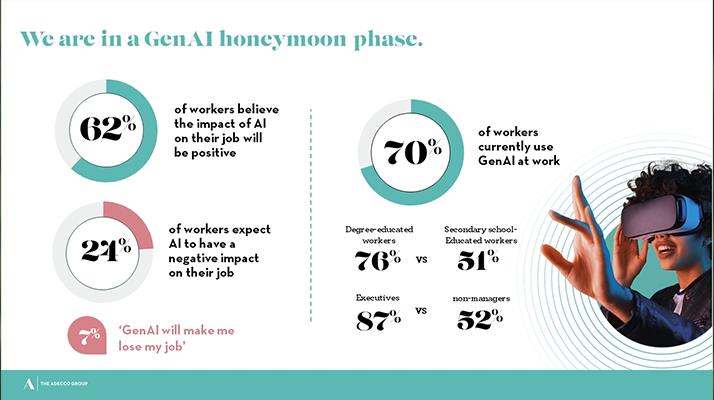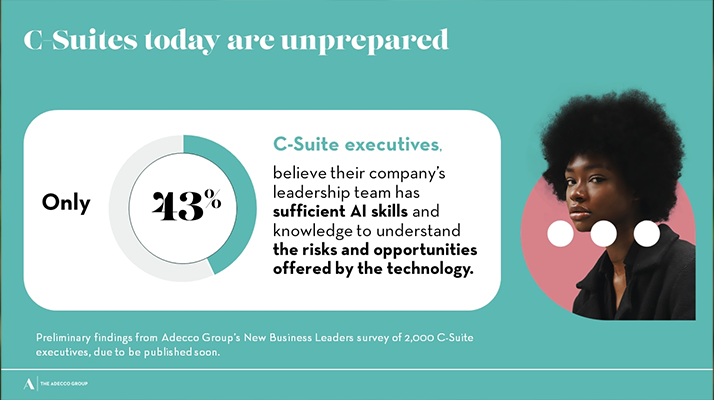This article was originally published by the World Economic Forum
Authored by Denis Machuel, CEO , The Adecco Group
It is hard to think of another technology that has become so ubiquitous in such a short space of time. In little more than nine months, the use of generative artificial intelligence has become so widespread in business that it feels like it’s been with us for years. And with ongoing improvements taking place at breakneck speed, it is easy to see why forecasters say that genAI could add trillions of dollars to the global economy in productivity gains.
But impressive as the technology may be, left alone it is unlikely to deliver this promised efficiency and prosperity. Empowering workers to make the most of this seemingly boundless technological potential is the next thing we must get right to get the job done.
Adecco Group’s annual global workforce study of more than 30,000 employees across 23 countries shows an astonishing 70% adoption rate of AI in the workplace. Let’s just reflect on that: In a matter of months since OpenAI’s Chat GPT was launched, almost three-quarters of workers say they are using it or one of a range of similar tools. Furthermore, 62% say the impact on their job will be positive, helping them save time and freeing them up to focus on more important tasks.
But scratch a little deeper and the research unearths issues that, unless tackled, threaten to undermine the full promise of genAI. The first is that there is an under-appreciation of the technology’s true potential and the impact it will have on jobs. A second is that access to the technology is far from equal and threatens to create a class of “haves” and “have-nots” in the workforce. And a third is that many workers are being left to fend for themselves with little or no guidance from their employer.

The issue of access is one of concern, with some – typically, the better educated and well-off – set to turbocharge their career, while others are being consigned to the slow lane. Our data showed 78% of higher-income workers – for example, those with an income of $60,000 or more – said they were using genAI, compared to just 60% of workers below that earnings threshold.
Seniority was also a factor, with 87% of executives saying they used genAI compared to 52% of non-managers. Similarly, higher educational attainment correlated with higher adoption rates, with 76% of people with degrees using AI versus 51% with just high school-educated qualifications.
In addition to what the workforce thinks, the Adecco Group is also assessing preparedness among senior leaders. Preliminary findings from our Business Leaders survey of 2,000 C-Suite executives, due to be published in full in coming weeks, show that only 43% of executives believe their company’s leadership team has sufficient AI skills and knowledge to understand the risks and opportunities offered by the technology.
I believe that for businesses to truly unlock the full promise of genAI, employees at all levels of all seniority, educational attainment and income level need to be guided to properly understand the full extent of the technology’s potential, and be given strategic direction and practical know-how from those in charge.

Furthermore, senior leaders must urgently get to grips with AI and provide practical clarity on the impact, relevance and opportunity of AI at work. Of the respondents in our study who had still not adopted genAI, 35% said it was because they don’t trust the technology, while 27% said they didn’t feel it was relevant to the work they do.I believe more can and should be done by employers to dispel these fears or they risk creating a two-speed workforce.
Companies of all sizes should look to deploy inclusive AI skilling initiatives at scale and at every level. This is an open goal, given that as many as two-thirds of respondents said that they think AI skills will improve their career options and make them more employable. Furthermore, over half [57%] want their company to provide the training needed to get the skills they need. That is not just in the interest of the employee, but of the company, given that the cost of hiring a new worker can be as much as seven times that of upskilling an existing employee.
As companies move from a honeymoon period of experimentation in 2023 and adopt the technology in earnest in 2024, it is imperative that companies and their leaders are up to the job of delivering on genAI’s huge potential. Employers must chart a clear course, offer the chance to upskill and make sure everyone shares in this next technological leap.



